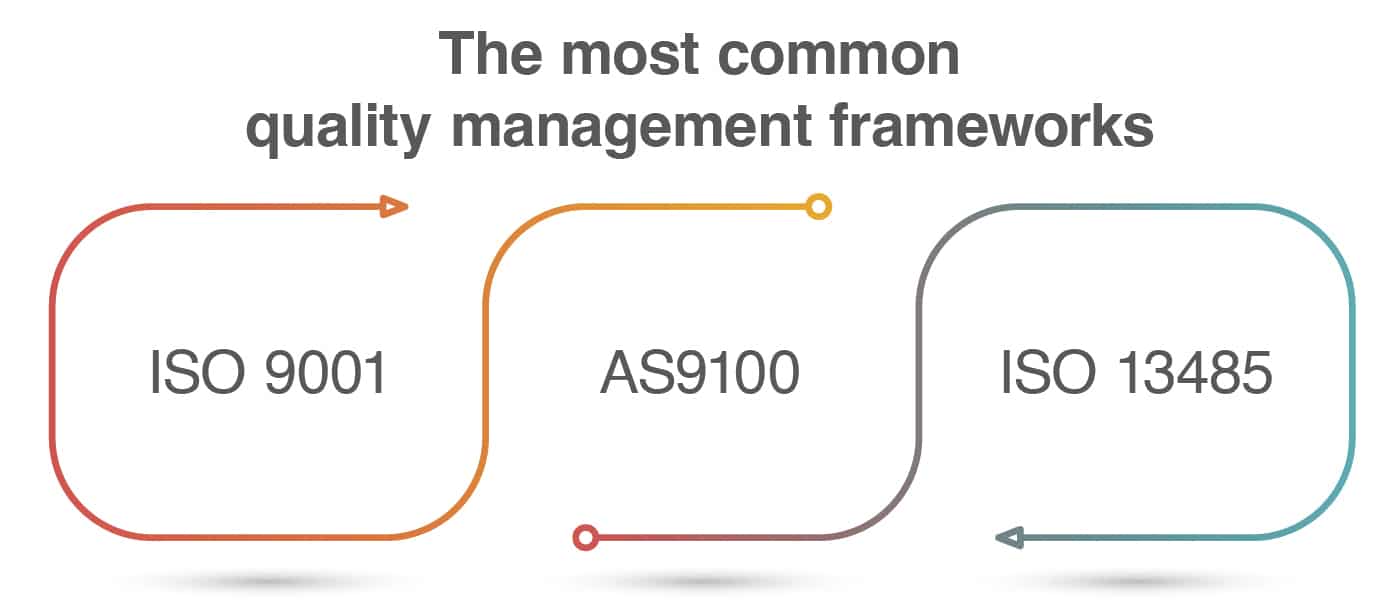Quality Certification is a general term that is used for two main things: certifying the knowledge of individuals, and certifying a company’s system of quality management.
Quality certifications for individuals can be granted through organizations such as the American Society for Quality (ASQ). Other certifications that can be obtained are ISO 9001 Lead Auditor, ISO 9001 Lead Implementer, or ISO 9001 Internal Auditor.
When it comes to certifying a company, the most common quality management frameworks are ISO 9001, ISO 13485, IATF 16949, and AS9100. All these quality certifications are recognized worldwide.
Certifying Individuals
Quality Certifications for individuals are available through several organizations around the world, such as the American Society for Quality (ASQ). Certifications are granted to show that individuals have demonstrated and maintain knowledge in an aspect of quality management, such as: Certified Quality Engineer (CQE), Certified Quality Inspector (CQI), and many more.
For information on ASQ certifications, see https://asq.org/cert.
Another certification that can be obtained by an individual is as an ISO 9001 lead auditor.
Certifying a Quality Management System
A Quality Management System (often called a QMS) can be designed according to many different sets of requirements. If the QMS is certified, this means that a Certification Body (sometimes called a Registrar) has done an audit against the requirements of the QMS, and also holds ongoing routine audits of the system to ensure the QMS is maintained.
Below are listed some of the available quality management frameworks. Some of these are in the form of standards (sets of requirements that define what is needed to implement a Quality Management System), while others are sets of Quality Management philosophies used to drive improvement.
Common Quality Management Frameworks
ISO 9001: The most commonly used set of requirements for designing a QMS. QMS certification against ISO 9001 is recognized worldwide.
For more information on ISO 9001 Certification, see the article How to get ISO 9001 certified.
AS9100: This is a standard that is based on ISO 9001 and has additions designed for use in the Aerospace Industry. A QMS can be certified by a third party to comply with this standard. For more, see the article What it is AS9100?
ISO 13485: This is a standard published by the ISO for use by companies that want to design a QMS for medical devices, and the requirements for regulatory purposes surrounding them.
Lean: The core idea is to maximize value by eliminating waste. The main idea is that anything that adds cost to a product, but not value, is waste and should be controlled or eliminated. This supports a QMS, but cannot be used to design or certify a QMS.
MBNQA: The Malcolm Baldridge National Quality Award recognizes US organizations for performance excellence. The award has a set of requirements against which a company could design and assess a QMS, but apart from the award there is no ongoing certification against these requirements.
Six Sigma: This is a set of tools and techniques used for process improvement. It is used in many organizations to support the QMS by helping to improve processes, but Six Sigma does not define a QMS, and the QMS cannot be certified to Six Sigma.
TQM: Total Quality Management consists of practices designed to improve the process performance of a company. The techniques help improve efficiency, problem solving and standardization of processes. These techniques are used to aid in quality management, but do not provide a framework for a Quality Management System, and cannot be certified to.
IATF 16949: This document includes requirements for the application of ISO 9001 for automotive production and service part organizations. A QMS designed using these requirements can also be certified against them.
To learn more about certification, check out this book: Preparing for ISO Certification Audit: A Plain English Guide.

 Strahinja Stojanovic
Strahinja Stojanovic 







